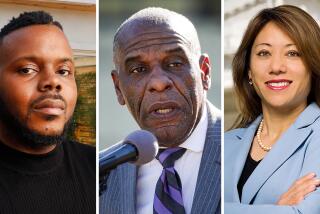Lungren’s Bid for Treasurer’s Post Goes Before State High Court
- Share via
The high-stakes political fight over confirmation of Rep. Daniel E. Lungren as state treasurer came before the California Supreme Court on Tuesday, with Democratic opponents urging the justices to reject the Republican nominee’s bid to take office with approval of only one house of the Legislature.
An attorney for Democratic legislators told an apparently divided court that the 1976 state constitutional amendment at the center of the dispute requires that both the state Senate and Assembly confirm the governor’s appointees to vacant statewide offices.
The authors of the amendment intended confirmation by both houses as a means of expanding “representative democracy,” said Joseph Remcho, a San Francisco lawyer.
But attorneys for Lungren and Gov. George Deukmejian said that the plain language of the amendment requires approval of only one house and that the justices should permit the Long Beach congressman to take the post.
“Our opponents are asking the court to pound a square peg into a round hole,” said James R. Parrinello, a San Francisco lawyer representing Lungren.
The justices heard the arguments in Los Angeles in the most politically charged case to come before the realigned body since the defeat of Chief Justice Rose Elizabeth Bird and two other liberals in the November, 1986, election.
Now, five of the seven court members are appointees of Deukmejian, a sharp critic of the Bird court--and the Lungren case, in the view of some observers, has emerged as a test of the new court’s independence.
In Tuesday’s one-hour hearing, questions from the justices seemed to reflect division over the case. One Deukmejian appointee, Justice Marcus M. Kaufman, appeared highly skeptical of the Democrats’ contentions, while the two justices appointed by Democrats seemed dubious of Republican arguments. A decision is expected by the end of summer.
Lungren, speaking to reporters later, said he expected the justices to make “what they think is the proper interpretation of the law.” He added that he saw “no suggestion” that the ruling would be based on political considerations.
The congressman, who has moved with his family to Sacramento while he completes his term, said that if he loses the case he would “get ready for a statewide race” in 1990 but offered no other details.
The governor named Lungren to the vacancy created last August by the death of Jesse Unruh, a Democrat. In a bitter battle in the Democratic-controlled Legislature, the nomination was approved by the Assembly but rejected by the Senate. Lungren brought suit, naming Deukmejian as the nominal defendant, and asked the justices to resolve a constitutional stalemate in his favor. Democrats, led by Senate President Pro Tem David A. Roberti of Los Angeles, entered the case to oppose Lungren.
First Interpretation
The case requires the court to make its first interpretation of the meaning of two provisions in the 1976 amendment.
The first simply says that a nominee shall take office “upon confirmation by a majority of the Senate and . . . of the Assembly.” The next sentence says that if the nominee “is neither confirmed nor refused confirmation by both the Senate and Assembly within 90 days of submission of the nomination, the nominee shall take office. . . .”
Lungren, backed by Deukmejian, says the amendment provides alternative methods of confirmation: by approval by both houses within 90 days, or when two houses do not approve or reject the nomination within 90 days.
Roberti and the Democrats reply that the first sentence mandates confirmation by both houses and that the second is intended only to allow a nominee to take office if either house refuses to act on the nomination.
‘No Complicated’ Principles
In Tuesday’s hearing, Parrinello, arguing for Lungren, said the case involved “no complicated or unusual legal principles” but was simply a matter of looking to the plain language of the amendment.
The attorney denied a suggestion by Justice Allen E. Broussard that there was “ambiguity” in the measure. “Our opponents do not like (the language of the amendment) and they would have the court rewrite it,” said Parrinello.
Justice Stanley Mosk noted that official ballot arguments made to voters on the 1976 measure--both for and against the amendment--indicated that confirmation would be required by both houses. The attorney replied that ballot arguments were irrelevant when the language was clear. In any event, he said, the focus of the arguments had been on whether there should be any kind of Legislative approval required.
Trying to Find ‘Ambiguity’
Vance Raye, the governor’s legal affairs adviser, argued that Lungren’s opponents were straining to find ambiguity in the law. “There obviously is no language created by man that somehow can’t be tortured into some kind of ambiguity by . . . an enterprising attorney,” Raye said.
Remcho, arguing for the Democrats, was questioned at length by Kaufman over why the drafters of the amendment phrased the measure as they did if they did not intend to allow confirmation by one house. Otherwise, the justice said, the language at issue would be meaningless.
The attorney conceded that the amendment was “inartfully drafted” but contended that the measure as a whole was intended to require two-house confirmation, except where one or both houses refused to act.
Remcho also asserted that two-house confirmation would widen the democratic process. However, Justice Edward A. Panelli observed that such a principle also could be recognized through a one-house approval requirement.
State Chief Assistant Atty. Gen. Richard Martland, representing Secretary of State March Fong Eu and other Democratic officeholders, said the two-house requirement would help force a governor to acquire a “consensus” for a nomination. Without it, Martland said, “you’re saying a governor doesn’t have to get a consensus at all.”
Kaufman, Panelli, Chief Justice Malcolm M. Lucas and Justices John A. Arguelles and David N. Eagleson were appointed to the court by Deukmejian. Broussard was named by Gov. Edmund G. Brown Jr., and Mosk by Gov. Edmund G. (Pat) Brown.
More to Read
Sign up for Essential California
The most important California stories and recommendations in your inbox every morning.
You may occasionally receive promotional content from the Los Angeles Times.













